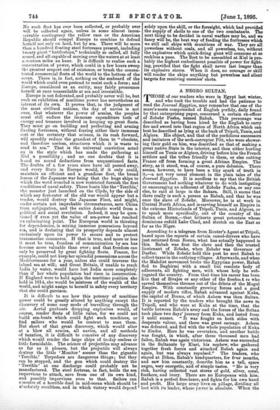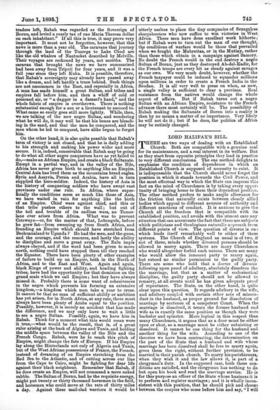A NEGRO SULTAN. T HOSE of our readers who were in
Egypt last winter, and who took the trouble and had the patience to read the Journal Egyptien, may remember that one of the mare's-nests compounded of English perfidy, daily found by that enterprising paper, concerned a certain ex-officer of Zobehr Pasha, named Rabah. This personage was described as having been hired by the English to carry fire and sword into that region of North Africa which can best be described as lying at the back of Tripoli, Tunis, and Algiers. His object, and that of the perfidious successors and imitators of the arch-corrupter Pitt, who were shower- ing their gold on him, was described as that of making a great native State in the interior, and then either hurling himself on Tunis or Algiers, driving before him the French settlers and the tribes friendly to them, or else cutting France off from forming a great African Empire. The story, as it stood, was, of course, a pure delusion. There seems, however, to have been a tiny spark of truth in it,—a not very usual element in the plain tales of the Journal Egyptien. It is needless to say that the British Government had nothing whatever to do with instigating or encouraging an adherent of Zobehr Pasha, or any one else, to raid at large in the Sahara. Still, it seems that there really is such a person as Rabah, and that he was once the slave of Zobehr. Moreover, he is at work in Central North Africa, and is carving himself an Empire in the extreme Hinterlands of Tripoli, Tunis, and Algiers, or to speak more specifically, out of the country of the Sultan of Bornu,—that hitherto great potentate whose dominions enfold Lake Chad, and stretch on the East as far as the Niger.
According to a telegram from Reuter's Agent at Tripoli, based upon the reports of certain camel-drivers who have just returned from Bornu, what has actually happened is this. Rabah was first the slave and then the trusted lieutenant of Zobehr, when Zobehr was Governor of Darfur. While Zobehr held this post he sent Rabah to collect taxes in the outlying villages. Afterwards, and when the Mandist movement broke the Egyptian power, Rabah fled to Baghirmi with a small but resolute body of adherents, all fighting men, with whose help he sub- jugated the country. From that time his career has been like that of Sivajee or any other of the freeboct rs who carved themselves thrones out of the debris of the Mogul Empire. With constantly growing forces and a good supply of modern rifles, Rabah advanced against Kuka, the capital of Bornu, of which Ashem was then Sultan. It is reported by the traders who brought the news to Tripoli, and who were at Kuka at the time, that the battle between Rabah's army and the forces of the Sultan took place two days' journey from Kuka, and lasted from 3 until sunset. " It was fought on both sides with desperate valour, and there was great carnage. Ashem was defeated, and fled with the whole population of Kuka to Zinder. Here he was overtaken, and another battle was fought, in which, after three thousand men had fallen, Rabah was again victorious. Ashem was succeeded in the Sultanate by Kiari, his nephew, who gathered together fresh forces and attacked Rabah again and again, but was always repulsed." The traders, who stayed at Dikoa, Rabah's headquarters, for four months, and saw him constantly, describe him as a tall, spare negro, very energetic, and of simple tastes. " He is very rich, having collected vast stores of gold, silver, coral, feathers, and ivory. There are no Europeans with him. Rabah is a perfect free-lance, and fights for his own hand and profit. His large army lives on pillage, dividing all loot with its leader, whose power is absolute. When the traders left, Rabah was regarded as the Sovereign of Bornu, and levied a yearly tax of one Maria Theresa dollar on each inhabitant." If all this is true, it may prove very important. It must not be forgotten, however, that this news is more than a year old. The caravans that journey through the land of the Tuaregs to Lake Chad are like the old whalers of Nantucket described by Melville. Their voyages are reckoned by years, not months. The caravan that brought the news we have summarised had been away from Tripoli for four years, and it was a full year since they left ICulia. It is possible, therefore, that Rabah's sovereignty may already have passed away like a dream, and left hardly a trace behind. Such things are not uncommon in the East, and especially in Africa. A man has made himself a great Sultan, and tribes and empires fall before him, and then a whiff of cold or poisoned air, or " a dagger in a damsel's hand," and the whole fabric of empire is overthrown. There is nothing substantial enough for a son or a lieutenant to succeed to. What came so easily goes still more lightly. While, then, we are talking of the new negro Sultan, and wondering what he will do, it may well be that his bones are bleach- ing in the sand, and that the men he conquered, and the men whom he led to conquest, have alike begun to forget him.
On the other hand, it is also quite possible that Rabah's term of victory is not closed, and that he is daily adding to his strength and making his power wider and more secure. It is, indeed, conceivable that Rabah may be going to do what all other negro conquerors have as yet failed to do,—make an African Empire, and create a black Sultanate. Except in a partial way, and in the valley of the Nile, Africa has never given birth to anything like an Empire. Central Asia has bred them as the mountains breed eagles. Syria and Assyria, Persia and Arabia, have all in turn supplied the hero-soldier. Indeed, the history of Asia is the history of conquering soldiers who have swept vast provinces under one rule. In Africa, where super- ficially the conditions seem so much like those of Asia, we have waited in vain for anything like the birth of an Empire. Chief wars against chief, and this or that tribe pushes others to the wall ; but out of the toil and trouble of its endless wars, no Tamer- lane ever arises from Africa. What was to prevent Cetewayo—or, for the matter of that, Lobengula, before he grew fat—from sweeping up from South Africa, and founding an Empire which should have stretched from Bechuanaland to Uganda ? He had the men, and the guns, and the courage, and the resource, and lastly the ability to discipline and move a great army. The Zulu impis always obeyed, and if the word had been given to move north, nothing could have stopped them till they reached the Equator. There have been plenty of other examples of failure to build up an Empire, both in the North of Africa, and to the East and West. Again and again, black Kings of power and ability, and heading fighting tribes, have had the opportunity for that dominion on the grand scale which we call Empire ; but they have always missed it. Probably there is some want of cohesiveness in the negro which prevents his forming an extensive kingdom,—a kingdom which men take a year to cross. It cannot be that no man of sufficient ability or ambition has yet arisen, for in North Africa, at any rate, there must always have been plenty of Arabs equal to the position. Possibly, however, it is merely an accident that has made the difference, and we may only have to wait a little to see a negro Sultan. Possibly, again, we have him in Rabah. Think for a moment what this would mean were it true,—what would be the result, that is, of a great ruler arising at the back of Algiers and Tunis, and holding the middle space between the valley of the Nile and the French Congo. Rabah, were he to reach this pitch of Empire, might change the fate of Europe. If his Empire lay along the Hinterlands not only of Algeria and Tunis, but of the West African possessions of France, the French, instead of dreaming of an Empire stretching from the Red Sea to the Atlantic, and of cutting across our line from the Cape to Cairo, might be fighting for dear life against their black neighbour. Remember that Rabah, if he does create an Empire, will not command a mere naked rabble. The Sultan of Bornu, had he the requisite energy, might put twenty or thirty thousand horsemen in the field, and horsemen who could move at the rate of thirty miles a day. Against these mail-clad warriors it would be utterly useless to place the tiny companies of Senegalese sharpshooters who now suffice to win victories in West, Africa. These men have done excellent work hitherto ; but if Rabah were to turn out the man of our thought, the conditions of warfare would be those that prevailed when we fought the Mahrattas, or in the Mutiny, rather than those which obtain in a campaign against Samory. No doubt the French would in the end destroy a negro Sultan of Bornu, just as they destroyed Ab-del-Kadir, for the French troops are every bit as steady against savages as our own. We very much doubt, however, whether the French taxpayer could be induced to squander millions upon millions in order to create a French India in the Soudan. It is all very well to press on when, as now, a single volley is sufficient to clear a province. Real resistance from the natives would change the whole aspect of affairs. But if Rabah turns out a negro Sultan with an African Empire, resistance to the French advance there most certainly will be. The possibility of Rabah making the Sultanate of Bornu into a reality is then by no means a matter of no importance. Very likely he will not do it ; but if he does, the politics of Africa may be entirely changed.







































 Previous page
Previous page